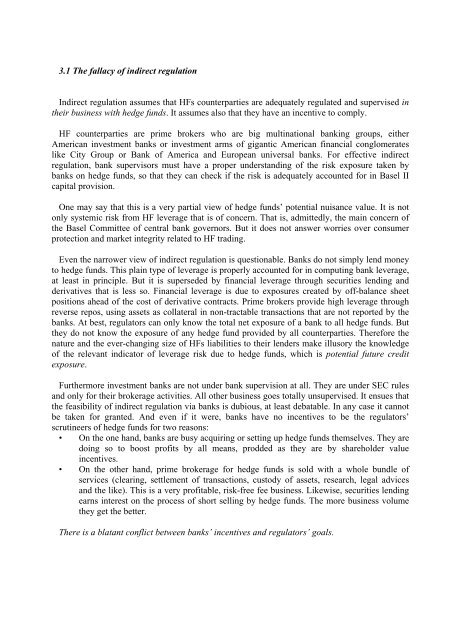Executive summary - Udo Bullmann
Executive summary - Udo Bullmann
Executive summary - Udo Bullmann
- No tags were found...
You also want an ePaper? Increase the reach of your titles
YUMPU automatically turns print PDFs into web optimized ePapers that Google loves.
3.1 The fallacy of indirect regulationIndirect regulation assumes that HFs counterparties are adequately regulated and supervised intheir business with hedge funds. It assumes also that they have an incentive to comply.HF counterparties are prime brokers who are big multinational banking groups, eitherAmerican investment banks or investment arms of gigantic American financial conglomerateslike City Group or Bank of America and European universal banks. For effective indirectregulation, bank supervisors must have a proper understanding of the risk exposure taken bybanks on hedge funds, so that they can check if the risk is adequately accounted for in Basel IIcapital provision.One may say that this is a very partial view of hedge funds’ potential nuisance value. It is notonly systemic risk from HF leverage that is of concern. That is, admittedly, the main concern ofthe Basel Committee of central bank governors. But it does not answer worries over consumerprotection and market integrity related to HF trading.Even the narrower view of indirect regulation is questionable. Banks do not simply lend moneyto hedge funds. This plain type of leverage is properly accounted for in computing bank leverage,at least in principle. But it is superseded by financial leverage through securities lending andderivatives that is less so. Financial leverage is due to exposures created by off-balance sheetpositions ahead of the cost of derivative contracts. Prime brokers provide high leverage throughreverse repos, using assets as collateral in non-tractable transactions that are not reported by thebanks. At best, regulators can only know the total net exposure of a bank to all hedge funds. Butthey do not know the exposure of any hedge fund provided by all counterparties. Therefore thenature and the ever-changing size of HFs liabilities to their lenders make illusory the knowledgeof the relevant indicator of leverage risk due to hedge funds, which is potential future creditexposure.Furthermore investment banks are not under bank supervision at all. They are under SEC rulesand only for their brokerage activities. All other business goes totally unsupervised. It ensues thatthe feasibility of indirect regulation via banks is dubious, at least debatable. In any case it cannotbe taken for granted. And even if it were, banks have no incentives to be the regulators’scrutineers of hedge funds for two reasons:• On the one hand, banks are busy acquiring or setting up hedge funds themselves. They aredoing so to boost profits by all means, prodded as they are by shareholder valueincentives.• On the other hand, prime brokerage for hedge funds is sold with a whole bundle ofservices (clearing, settlement of transactions, custody of assets, research, legal advicesand the like). This is a very profitable, risk-free fee business. Likewise, securities lendingearns interest on the process of short selling by hedge funds. The more business volumethey get the better.There is a blatant conflict between banks’ incentives and regulators’ goals.





